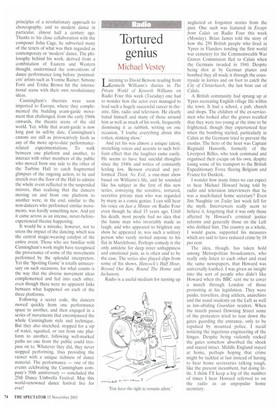Tortured genius
Michael Vestey
T istening to David Benson reading from .1-/Kenneth Williams's diaries in The Private World of Kenneth Williams on Radio Four this week (Tuesday) one had to wonder how the actor ever managed to lead such a hugely successful career in theatre, film, radio and television. He clearly hated himself and many of those around him as well as much of his work, frequently dismissing it as rubbish, writing on one occasion. 'I loathe everything about this rotten, stinking show.'
And yet his was almost a unique talent, stretching voices and accents to such brilliant effect that the laughter came easily. He seems to have had suicidal thoughts since the 1940s and writes of constantly feeling low. Benson created and performed Think No Evil, a one-man show based on Williams's life, and he sounded like his subject in the first of this new series, conveying the sensitive, tortured, secretive private man who was regarded by many as a comic genius. I can still hear his voice on Just a Minute on Radio Four even though he died 15 years ago. Until his death, most people had no idea that the funny man who invariably made us laugh, and who appeared to brighten any show he appeared in, was such a solitary person who rarely invited anyone to his flat in Marylebone. Perhaps comedy is the only antidote for deep inner unhappiness and emotional pain, as is often said to be the case. The series also played clips from some of his shows, Hancock's Half Hour, Beyond Our Ken, Round The Home and Jackanoty.
Radio is a useful medium for turning up neglected or forgotten stories from the past. One such was featured in Escape from Calais on Radio Four this week (Monday). Brian James told the story of how the 250 British people who lived in Ypres in Flanders tending the first world war cemetery for the Commonwealth War Graves Commission fled to Calais when the Germans invaded in 1940. Despite being shot at by German planes and bombed they all made it through the countryside in lorries and on foot to catch the City of Christchurch, the last boat out of Calais.
A British community had sprung up at Ypres recreating English village life within the town, It had a school, a pub, church and shops. The children of the ex-servicemen who looked after the graves recalled that they were too young at the time to be frightened, though they experienced fear when the bombing started, particularly in Calais as the Germans tried to prevent the exodus. The hero of the hour was Captain Reginald Haworth, formerly of the Liverpool Rifles, who took command and organised their escape on his own, despite losing some of his transport to the British Expeditionary Force fleeing Belgium and France for Dunkirk.
I wonder how many times we can expect to hear Michael Howard being told by radio and television interviewers that he was a much-hated home secretary? Even Jim Naughtie on Today last week fell for the myth. Interviewers really seem to believe it, forgetting that it was only those affected by Howard's criminal justice reforms and generally those on the Left who disliked him. The country as a whole, I would guess, supported his measures which are said to have reduced crime by 18 per cent.
The idea, though, has taken hold among Metropolitan broadcasters, who really only listen to each other and read the same newspapers, that Howard was universally loathed. I was given an insight into the sort of people who didn't like Howard when the BBC sent me to cover a march through London of those protesting at his legislation. They were punks, travellers, drug addicts, anarchists and the usual students on the Left as well as law-abiding Guardian readers. When the march passed Downing Street some of the protesters tried to tear down the gates guarding the entrance, only to be repulsed by mounted police. I recall noticing the ingenious engineering of the hinges. Despite being violently rocked the gates somehow absorbed the shock and stayed intact. Middle England stayed at home, perhaps hoping that crime might be tackled at last instead of having to hear home secretaries talking tough, like the present incumbent, but doing little. I think I'll keep a log of the number of times I hear Howard referred to on the radio as an unpopular home secretary.


























































































 Previous page
Previous page